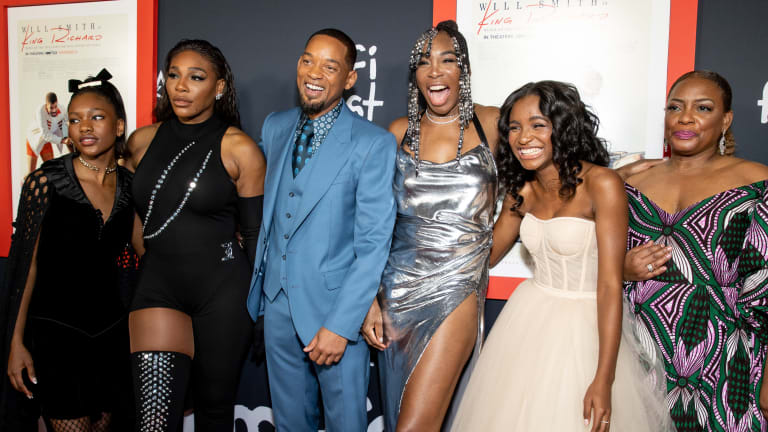The performances in King Richard are uniformly excellent. Aunjanue Ellis plays Richard’s wife, Oracene, as the backbone of the family and a necessary bulwark of normalcy who reins her husband in when his dogma gets the better of him. She works as a nurse, and coaches and encourages Serena while Richard is focused on Venus. She has what might be the movie’s best and most crucial scene, when she confronts Richard about his fear of failure, and how he’s letting it hold back Venus’s development. Richard had the plan for world domination, but he couldn’t have made it work without Oracene, and it’s good to see her get her proper due in the Williams saga.
The same is true for Rick Macci, their primary coach in the early days. Joe Bernthal, sporting short shorts, tube socks and bouncy hair, injects a welcome dose of manic hustle into the movie’s second act. As for Venus and Serena themselves, the actresses who play them look their parts, right down to the smiles and stares, and do a credible job of swinging their racquets like them.
The Williams story is well-known to tennis fans, but King Richard brings it to vivid life. We see how out of place Richard must have looked and presumably felt virtually everywhere he went—he dresses in tennis clothes in Compton, and is the only black man at the clubs and junior tournaments where he takes his daughters. He’s determined to be a father to them, to teach them to work hard, to value education, to stay off the streets of Compton, to have confidence in themselves, in whatever world they enter, and not to brag about their successes or play so much that they burn out. When one of Venus’s junior opponents makes a bad call against her, Richard tells his daughter to let it go and move on. Unfairness is part of the game, and part of life, and not something he’ll let get in the way of his master plan for them.
Early in the movie, Richard drives Venus and Serena, in his now-famous VW van, to see a professional coach at a white club. On the way, he says, half to himself and half to them, that the world has never had any respect for Richard Williams, but that it’s going to respect them. It’s a moving line and revealing admission, but it also made me wish for more about Richard’s background, his days growing up Shreveport, LA, during segregation in the 1940s and 50s, and how that informed his attitudes toward fatherhood and American life. Richard tells a story of being beaten by whites for handing a white store clerk a dollar bill, and how he looked up to see his father running away from the fight. In the movie’s climactic scene, when Venus is struggling in her professional debut against world No. 2 Arantxa Sanchez Vicario, Richard does the opposite. He walks into the stadium and joins his family to show his support for his daughter in defeat.
King Richard celebrates the architect of the Williams story. His predictions all come to pass, and his unorthodox moves—not playing juniors, not signing with Nike—are validated. But at the film’s end the focus switches to Venus, which is appropriate. There have been a lot of tennis parents with master plans, and a lot of their children have grown up believing they’ll be No. 1 in the world. But the vast majority never come close, because they aren’t good enough. Yes, Richard had the vision, but Venus and Serena were the ones who fulfilled it, because they were good enough. I’m looking forward to the sequel on them.
